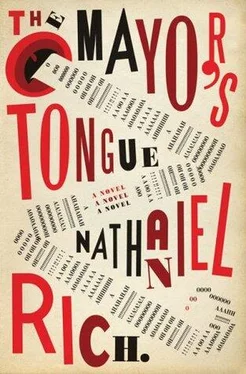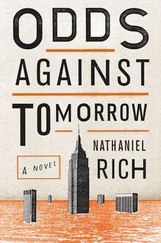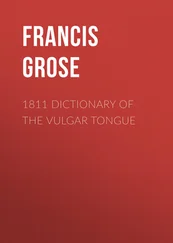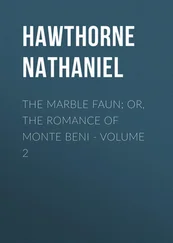Mr. Schmitz spots the next envelope from Rutherford during a brief turn at home from the hospital. He has come to shower, change his clothes, and collect new reading material. Glancing through the heap of mail sitting on his doormat, he sees a thick manila envelope bearing the Poste Italiane sticker. When he picks it up, a heavy scent of bergamot plumes into the air.
Mr. Schmitz scans the letter and finds it difficult to understand.
Rutherford's command of language appears to have deteriorated. At times he seems to be writing in koans, elsewhere in code. Mr. Schmitz wonders what he could possibly be trying to say.
In the letter, Rutherford explains — as far as Mr. Schmitz can tell — that his head malady has indeed healed. The doctor understood Rutherford's ailments and recommended an MRI. But it no longer mattered. For as soon as Rutherford entered the doctor's office and began speaking to the receptionist, his head cleared. What's more, Rutherford had surprised himself by speaking perfect Italian. The pain never returned. He prays that Mrs. Schmitz will experience the same kind of rapid recovery.
Despite Rutherford's strange diction, Mr. Schmitz is relieved to receive Rutherford's sympathy. He has not been able to discuss his wife's condition with anyone besides her doctors.
Rutherford does not mention the shirtless street urchin again. Mr. Schmitz assumes the boy has vanished. When he finishes reading the letter, he grabs a couple of novels and magazines, a pillow, a blanket, a thermos, and a plastic bag containing the contents of the top shelf of the medicine cabinet, and leaves again for the hospital.
In the following weeks, Rutherford does not send any more letters, but instead a train of postcards, bearing views of Lake Como, Milan's Duomo, and a piazza in Monza. Rutherford does not respond to the questions posed by Mr. Schmitz in his increasingly frequent, and increasingly anxious, letters. Most upsetting, Rutherford ceases to acknowledge Mr. Schmitz's forlorn reports from the hospital, where Agnes lies in mute agony. Rutherford's notes are instead filled with obscure doodles, jokes that rely on Italian puns that make no sense to Mr. Schmitz, and short passages — descriptions of place and cryptic snippets of dialogue — that seem, in their formalized style, to be quotations from English novels and history books. On the back of one postcard, Rutherford has written simply:
Schmitz!
I cannot liberate my malady of the head. And that, I say, is the humor of it.
The next postcard reads:
Schmitz!
In sum I feel that this opaque seaport of my vision, so full of sweet melancholy, illustrates not just my adolescent emotions of the past, but my lifelong preoccupations too. The Trieste effect, I call it. It is as though I have been taken, for a brief sententious glimpse, out of time to nowhere.
Beneath Mr. Schmitz's address is a hastily sketched doodle of a little boy waving.
A month later another note arrives:
Schmitz!
Hello da Monza. Ho visto oggi la mia fidanzata. Si, la mia fidanzata. Non lo dico per scherzo. Quando l'ho vista, sono svenuto. Ma anche lei è svenuta. Tutti e due di noi stavamo sdraiati per terra. Molto di più da dirti nella mia prossima lettera.
Mr. Schmitz puzzles over this letter for several minutes. Finally, with the aid of his worn Italian dictionary, he tries to decipher it. In his translation, it reads:
Hello from Monza. I saw today my girl. Yes, my girl. I'm not joking. When I saw her, I fainted. But she fainted too. Both of us were lying on the ground. Much more to tell in my next letter.
Mr. Schmitz has no idea who the girl is, and can only marvel that Rutherford has not bothered to mention Agnes. Despite the fact that, in his last letter, Mr. Schmitz explained that her ovaries had been removed. She hasn't opened her eyes for three weeks, except for when the nurse stretched the lids back to administer saline drops. In response, from his closest friend in the world, he receives only nonsense and obscurity. After that, there are no more letters, and only one more postcard. "Schmitz!" it says.
And that is all.
Oooooh," said Lang, giggling to himself. "My feet are wet. They tickle." In the dark tunnel, the river had calmed. Eugene and Lang were walking on the rockbed along the side, where the footing was more stable.
"Do you think we're near?" asked Eugene. He was breathing heavily now and, not for the first time, genuinely concerned for his physical safety." Don't tell me if we're not."
There was no response, only the steady rush of water. The air felt close and thick and smelled like iron. Far behind him, at the opening of the tunnel, the oval of light grew dim, until it finally disappeared. Once in a while one of them would slip on a slick stone or get smacked in the forehead by a protuberant rock shelf. When this happened to Lang, he would snort and exclaim, "What fun!" Eugene would gasp and curse himself.
A region of light began to appear ahead of them. In it they could see the river tumbling over the submerged boulders, spotted with slimy growths; the jagged stalactites that hung like fro- zen rain; and the cavern walls, densely beaded with condensation. A light mist coiled lazily over the river.
"Here the rock gets extremely thin; it's almost like paper," said Lang, pointing to the tunnel's ceiling. And Eugene could see it for himself — the calcite overhead was translucent, so that the sunlight filtered through, between fissures snaked like green veins. So while it was still dark, the underground river was now lit by a spectral glow, the outside world seeping in from above. Eugene pressed his book bag close to his chest, and his thoughts turned to Sonia. He somehow expected to see her around each bend, reclining on a boulder, perhaps, or washing her hair in the river, sirenlike.
After they had walked for more than an hour, the tunnel opened into a clearing surrounded by dense juniper. Above the clearing there rose a vineyard terraced on a hill, and beyond that, the limestone mountains. The woods rattled with unseen life. Eugene had never been anywhere like it. He sensed that he was close to something— to Sonia, perhaps, but maybe something even bigger.
There was a man on the hill above the clearing. He chopped vigorously at a stump of wood with an enormous blunt ax. He couldn't have been more than forty years old, though his round features were disguised by a bushy mustache and triangular goatee, and the Carso climate had given his skin a leathery, forlorn quality.
Lang clapped his hands with pleasure.
"GorAN!" shouted Lang. His voice scared a flock of sparrows into flight. The mountain man looked up from his ax to see the two dirt-caked men — one tall and young, the other tiny and shriveled — standing at the bottom of his property.
"Do you know him?" whispered Eugene. Lang did not reply but waved his arms excitedly.
The man approached, ax in hand. A horrified look of recognition slowly spread across his face. He hollered a greeting in a Slavic tongue, to which Lang responded, in his perfect Italian,
"Speak in Italian for the boy. His name is Eugenio."
"Eugenio," said Goran, becoming animated. "You look like a goat shit!"
"He's a funny man," whispered Lang to Eugene." You'll never guess what he will think of next."
Eugene followed Lang up a stone path, through several plateaus where tangled vines and clusters of full black grapes hung from white trellises.
"What are you chopping?" asked Lang when they had reached the top of the hill.
"Tree stump," replied Goran. "It's good exercise and also beneficial for relaxation of the nerves. I need to be in top condition for the harvest next month."
Читать дальше












